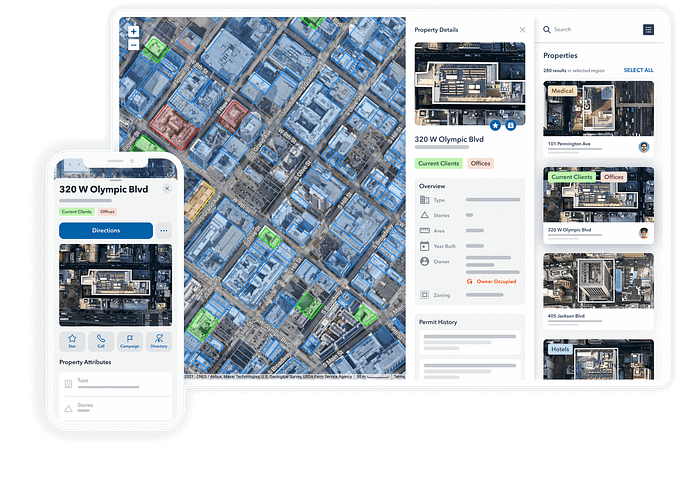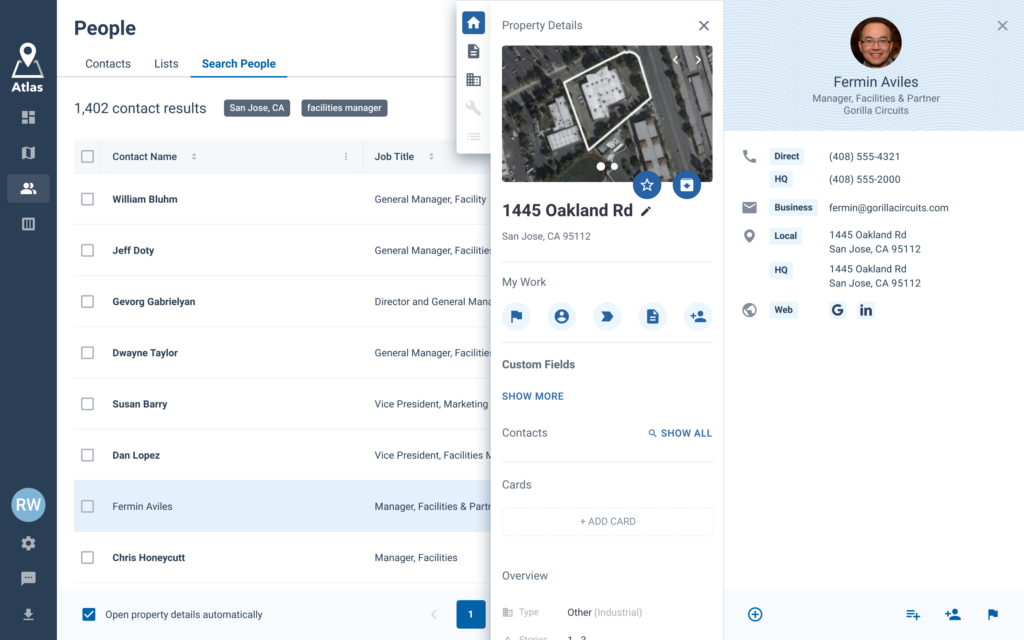Introduction
As the world has grown in complexity, so have the tools needed to meet the demands of an effective sales team. With the rise of big data and advanced analytics, sales intelligence has become an integral part of every successful commercial services company’s strategy. Using the best sales intelligence enables companies to gain valuable insights into potential customers’ behaviors and needs. This allows them to tailor outreach messaging, connect with buyers at the right time, and drive closed/won deals.
In this guide, we’re going to explore sales intelligence in depth- and arm you with the resources to decide if investing in a sales intelligence platform is the right choice for your team.
We’ll begin by covering the basics so you know how the tools work, and the benefits of using them, and show you how they can be effectively implemented if you decide to move forward. The best sales intelligence tools can improve lead qualification, personalize sales conversations, and automate the prospecting process.
This is a comprehensive guide to sales intelligence solutions- so don’t be afraid to jump around a bit to find answers to your most pressing questions or even refer back to the sections that are most relevant to your current team’s needs.
Let’s get started!

What is Sales Intelligence?
We use the term “sales intelligence” loosely to refer to many different tools that gather and analyze data at different points in the sales process, including sales intelligence data from various online sources such as websites, social media platforms, site usage data, and browser cookies. But, since there are more than 200 different sales intelligence tools on the market today, it’s important to clarify that many of these tools are very different in nature.
Some platforms act as databases of names, titles, and contact information for list building and prospecting, others offer property intelligence, tools for outreach, buyer signals, and route mapping, and still others provide insights into the quality of sales conversations for coaching purposes.
In short, sales intelligence in its purest form is a tool to help reps get more deals, faster, and with greater clarity.

Common Misconceptions about Sales Intelligence, Sales Enablement, and CRM Software
Before we get into the benefits of implementing the right sales intelligence software, it’s important to distinguish sales intelligence from sales enablement and CRM systems. These platforms are often described interchangeably but they have very different uses. Sales intelligence tools often include sales automation features that reduce manual workloads and improve efficiency for a sales organization.

Difference Between Sales Intelligence and Sales Enablement
Sales intelligence is all about collecting and analyzing data through a sales intelligence solution to shape effective sales strategies. You can think of it as “the brain” providing insights for your team to close deals.
Sales enablement, on the other hand, equips the sales team with the necessary tools, content, and training to act on those insights. Using the same analogy, sales enablement acts as “the muscle” that executes the objectives set by the brain. Together, they form a dynamic duo that enhances your sales efforts.

Difference Between CRM and Sales Intelligence
Customer Relationship Management (CRM) systems are the heart of effective customer data and sales process management. They organize and track every stage of the sales cycle, from initial contact to deal closure, ensuring every interaction is logged and easily accessible.
But, sales intelligence tools can add strategic depth. These platforms gather and analyze data to deliver actionable insights that guide sales reps on how and when to engage with potential clients.
Sales intelligence solutions like Convex identify buyer signals and enrich the CRM’s data with detailed prospect information that can inform the sales process and tailor outreach messaging, offers, and other vital communication. Tracking data such as permits and installed systems, these tools help reps approach each interaction strategically providing optimum value to the prospect.
Sales intelligence tools can also enhance the CRM ecosystem by providing verified contact details—updated email addresses, phone numbers, job titles, and industry specifics.
By leveraging both a CRM system and sales intelligence platforms, sales organizations equip their reps with insights that turn routine interactions into opportunities for growth and relationship-building.

Benefits of Implementing a Sales Intelligence Platform
Making first contact with a potential customer is often the most tedious part of a sales cycle. Knowing who to talk to and what to say is vital to a successful first interaction. This is where sales intelligence can make all the difference. By leveraging intent data, businesses can identify those actively researching specific topics or products, enhancing targeting and engagement.
According to Salesforce, traditional prospecting takes up to 21% of a sales rep’s time. Meaning, in a 40-hour work week, up to 2 hours per day will be spent on research. The right sales intelligence tool can do that same process in 3- 5 minutes- making your sales team significantly more efficient at generating hot leads.But, sales intelligence solutions aren’t only for saving time. In this section, we’ll cover a few of the benefits of implementing sales intelligence tools like Convex.

Understanding Your Customers
Sales intelligence tools offer deep insights into your customers’ behaviors, needs, and preferences. They do this by using data to identify buying signals that can help sales reps know when a prospect needs your services.
For example, when a building manager is searching for “elevator maintenance,” or looking for commercial cleaning companies. This clarity allows you to personalize your outreach and tailor your messaging to their needs, significantly increasing your chances of closing deals.

Efficient Prospecting
One of the key benefits of using a platform like Convex is its best-in-class data. This ensures your team has access to accurate, up-to-date contact information, making prospecting more efficient and less confusing.
With reliable data, you can precisely target specific building types, industries, or roles, saving time and significantly enhancing your research.

Increasing Sales Efficiency
Convex can complete the same 1- 2 hour prospecting research process in 3- 5 minutes. This means you find the right people, at the right time, with less effort.
Once you have a list of prospects, our Generative AI can help you create personalized outreach messaging (whether by email or phone) based on what they’re already trying to find- this makes the outreach process personalized and simple.
Using the data collected, our Generative AI can help you prepare for sales calls with accurate details based on the prospects needs – meaning you’re reaching out at the right time, with the right message.r Facebook to connect with potential prospects and build relationships within your industry.

Improving Customer Relationships
These detailed insights into customer preferences and behaviors enable you to tailor your interactions and offerings leading to more consultative closes and relationship-based sales. This level of personalization leads to better customer satisfaction and loyalty, meeting the high expectations of today’s market.

How to Choose the Right Sales Intelligence Software
Choosing the right sales intelligence platform can seem overwhelming, especially with over 200 options available.
Many of the sales intelligence tools available today are more like a phone book than modern intuitive technology. They use outdated lists of contacts that you have to filter through- leading to long research processes.
Data Quality: Opt for a platform that provides accurate and up-to-date data from reliable sources. High-quality data is critical in commercial services, where service requirements can be very specific. Reliable data ensures that your team is always working with the best information available.
Ease of Use: The solution you choose should be user-friendly and require minimal training for your sales team to get up and running- otherwise it won’t be used. Change can be hard. Your sales team doesn’t want some cumbersome new tool to learn- they want something that will easily help them close more deals and make more money. A good sales intelligence software is intuitive and easy to adopt, so your team can focus more on closing deals and less on learning new systems.
Scalability: Choose a solution that can grow with your business and adapt to changing needs. As your company expands its service offerings or enters new markets, your sales intelligence platform should scale accordingly, providing continuous support for your sales efforts without missing a beat.
Integration Capabilities: Ensure that the solution integrates seamlessly with your existing CRM and other sales tools. For commercial services, your sales intelligence platform must work well with systems tracking building management, tenant information, and service histories. This integration helps create a unified workflow, reducing friction and enhancing efficiency.
Customer Support: Select a provider that offers robust customer support and training resources. In the commercial services industry, where downtime can impact client satisfaction, having access to quick and effective support is crucial for resolving any issues promptly.
Industry-Specific Insights: Ensure the platform provides insights tailored to the commercial services industry. This might include data on building maintenance schedules, tenant turnover rates, or historical service needs, allowing your sales team to approach prospects with highly relevant information.
Generative AI: Generative AI is the “new kid on the block,” but don’t let that deter you from using it. Convex’s Generative AI is currently helping teams at Koorsen Fire & Security close more deals faster – writing outreach emails, automating processes, and shortening sales cycles.
Jeff Scalise, Sales Manager at Koorsen uses Convex’s suite of sales intelligence and Generative AI tools to create a better work-life balance for himself and his team. Here’s what he had to say:
“Work life has improved for me and my team because it’s really cut down on the time that it takes to research customers and actually send our emails. I would recommend Convex’s Generative AI email product to other companies because it truly is a superior product that provides a tremendous solution to the issues the industry faces.”
For more details, you can watch the full testimonial here.
By considering these factors before selecting a platform, you can choose the one that not only meets your business needs but also addresses the unique challenges faced by your sales team. This strategic choice will help drive sales success and make your team more efficient and effective.

The Role of Sales Intelligence in Modern Business for Sales and Marketing Teams
Sales intelligence has moved from being a luxury to an absolute necessity in today’s competitive commercial services landscape. It provides the crucial data and insights needed to stay ahead of the competition and adapt to the ever-evolving needs of customers. We’ve already touched on many of these points, but let’s define them.
If you’re struggling with poor prospect data and targeting, low email open rates, inefficient sales processes, misaligned teams, or low conversion rates, sales intelligence platforms are a must! They:
Improve Targeting: Identify the most promising prospects and tailor your outreach efforts to address their specific needs. This precision ensures that your efforts are focused where they can have the most impact.
Enhance Personalization: Use data to craft personalized marketing and sales messages that truly resonate with prospects. Personalization helps build stronger connections and increases the likelihood of success.
Boost Efficiency: Streamline the sales process by automating routine tasks, allowing your team to focus on high-value activities. This approach not only saves time but also enhances productivity.
Align Sales and Marketing Teams: Improve targeting and engagement by utilizing sales intelligence tools that help sales and marketing teams identify and connect with potential customers. These tools facilitate personalized outreach, a better understanding of buyer intent, and ultimately boost revenue.
Increase Conversion Rates: Use insights to develop more effective sales strategies and close deals faster. By understanding what drives your prospects, you can tailor your approach to meet their needs more effectively.
Strengthen Customer Relationships: Gain a deeper understanding of customer needs and preferences to build stronger, more lasting relationships. This knowledge allows you to provide better service and foster loyalty.

Overcoming Common Challenges Implementing Sales Intelligence
Implementing sales intelligence can be transformative, but it’s not without its hurdles. You may face some pushback trying to implement these tools- which is usually a bias that comes from poor experiences in the past.
Understanding these challenges and addressing them head-on is crucial for successful adoption. Here’s how to navigate common obstacles:
Data Overload: The sheer volume of data can be overwhelming. Focus on key metrics that drive your business and utilize AI-powered tools to sift through and analyze data efficiently. This approach ensures you extract actionable insights without getting bogged down.
Resistance to Change: Sales teams might resist new tools and processes. To overcome this, provide comprehensive training and clearly demonstrate the tangible benefits of sales intelligence. Show how it can make their jobs easier and more productive, and produce better results! This will foster less resistance to the change.
Integration Issues: Seamlessly integrating new systems with existing ones can be challenging. Collaborate closely with your IT team and choose a solution known for its compatibility and ease of integration. This will help ensure a smooth transition and minimal disruption.
Maintaining Data Quality: Accurate and reliable data is essential. Regularly update and clean your data, using tools that automate data enrichment and validation. This practice maintains the integrity of your data, ensuring you always have the best information at your fingertips.
Budget Constraints: Implementing new technology can be expensive. To address budget concerns, start with a clear ROI analysis. Demonstrate how the investment in sales intelligence can lead to increased efficiency, higher sales, and ultimately, greater revenue. This helps justify the expense and secure buy-in from stakeholders.
At Convex, we addressed many of these challenges by contextualizing the data into a format that’s easy to use. Take data overload, for example- we built Atlas to create greater visibility for sales and transform complex data into actionable insights. Known as property intelligence, our system works like Google Maps, allowing your team to find exactly what they need.

Integrating Sales Intelligence with Existing Systems
One of the key benefits of sales intelligence tools is their ability to integrate seamlessly with existing CRM systems and other sales enablement tools. This integration ensures that all relevant data is centralized and easily accessible, enabling sales teams to work more efficiently and effectively.
Integrating sales intelligence with CRM systems also benefits marketing teams by providing a holistic view of prospects and customers, which helps in personalizing outreach and improving conversion rates.
For example, integrating a sales intelligence platform like Convex with a CRM system like Salesforce or HubSpot can provide a 360-degree view of each prospect and customer.
This holistic view enables sales teams to understand the full context of their interactions with a prospect, including their interactions with other touch points such as marketing campaigns or customer service inquiries. This allows for more personalized and effective outreach, leading to stronger relationships and higher sales.
Jared Rothberger, CEO and Owner of Jan-Pro Franchise Development uses Convex’s property intelligence system to achieve growth goals and drive sales. You can hear his story here.

Future Trends in Sales Intelligence
As technology continues to advance, sales intelligence will become even more sophisticated and integral to business success. Some future trends to watch are:
AI and Machine Learning: Continued advancements in AI and machine learning will lead to even more accurate predictions and insights, enabling sales teams to anticipate customer needs and behaviors with greater precision.
Big Data: The increasing availability of big data will provide sales teams with even more information to inform their strategies. However, the challenge will be to effectively manage and analyze this data to extract meaningful insights.
Real-Time Insights: The demand for real-time data will grow, enabling sales teams to respond quickly to changes in the market and customer behavior.
Enhanced Personalization: As sales intelligence tools become more advanced, the ability to create highly personalized sales and marketing messages will improve, leading to better engagement and conversion rates.
Integration with Other Technologies: Sales intelligence tools will continue to integrate with other business technologies, such as marketing automation platforms, customer service tools, and financial systems, to provide a more comprehensive view of the business and its customers.

In Conclusion
Sales intelligence tools are a game-changer for businesses in the industrial or commercial services sector. By harnessing the power of data and advanced analytics, sales teams can make more informed decisions, engage with prospects more effectively, and ultimately drive more revenue.
As technology continues to evolve, the potential for sales intelligence will only grow, making it an essential tool for any business looking to stay competitive in the modern market.
Whether you are a sales professional, a business owner, or a sales manager, staying on top of the latest trends and tools in sales intelligence is critical.
With the right approach, sales intelligence can transform your sales processes and set your team and business on the path to success. So, take the leap, invest in the right tools, and begin reaping the rewards of these high-tech solutions today.
Ready to accelerate business growth? Schedule a demo to discover how our sales intelligence platform can empower your team and help you achieve your sales goals.
Share





